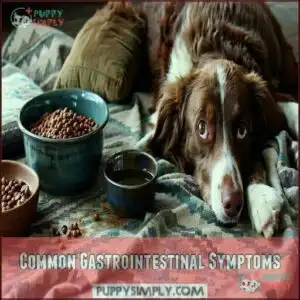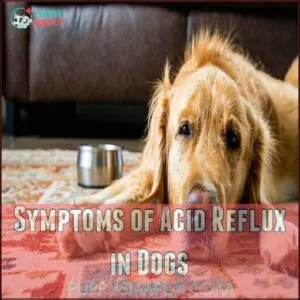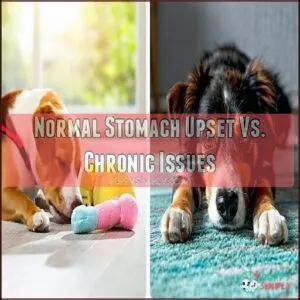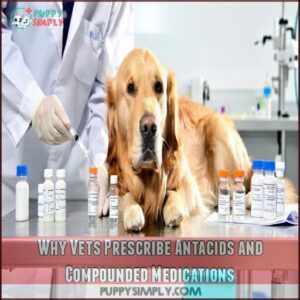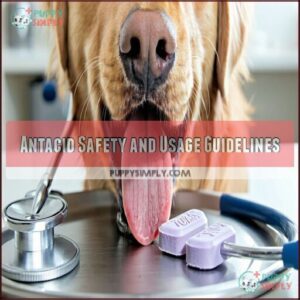This site is supported by our readers. We may earn a commission, at no cost to you, if you purchase through links.

While the calcium carbonate in Tums can help with mild stomach upset, some versions contain xylitol, which is toxic to dogs.
Even without xylitol, Tums may interfere with medications or cause side effects like diarrhea.
It’s also not a long-term fix for chronic issues like acid reflux.
If your dog accidentally eats Tums or you’re considering giving it to them, consult your vet first.
They can recommend safer alternatives or guide you on proper care.
Sometimes, a bland diet or prescribed antacid works better for your pup.
Table Of Contents
- Key Takeaways
- Signs of Stomach Issues in Dogs
- Why Tums Are Not Safe for Dogs
- What to Do if Your Dog Eats Tums
- Antacids for Pets: Safe Options and Usage
- Antacid Safety and Usage Guidelines
- Safe Alternatives for Upset Stomachs in Dogs
- Can Dogs Have Antacids Like Pepto-Bismol?
- Preventing Stomach Issues in Dogs
- Frequently Asked Questions (FAQs)
- Can dogs eat Tums for upset stomach?
- Are TUMS good for dogs?
- What happens if a dog eats TUMS?
- What should I do if my dog ate too many TUMS?
- Can a dog eat TUMS if he has heartburn?
- Can dogs eat TUMS & Pepto-Bismol?
- What happens if a dog eats 1 Tums?
- How much Tums can I give a dog?
- What antacids can I give my dog?
- Can I give my dog Tums or Pepto-Bismol?
- Conclusion
Key Takeaways
- Always check with your vet before giving Tums to your dog, as some versions contain xylitol, which is toxic.
- Tums aren’t a long-term solution for digestive issues like acid reflux and may interfere with medications.
- Safer alternatives include bland diets, vet-prescribed antacids, or natural remedies like pumpkin puree.
- Watch for symptoms like vomiting, diarrhea, or lethargy if your dog accidentally eats Tums, and contact your vet immediately.
Signs of Stomach Issues in Dogs
If your furry friend seems under the weather with stomach troubles, you’ll want to know the telltale signs.
Understanding your dog’s digestive health can help you catch potential issues early and keep them feeling their best.
Catch stomach troubles early to keep your furry friend happy, healthy, and feeling their absolute best every day!
Common Gastrointestinal Symptoms
When your dog’s belly starts acting up, it’s like an alarm bell ringing.
Watch for telltale signs: frequent vomiting, diarrhea’s changing consistency, or sudden constipation.
Your pup might lose appetite, show discomfort through whimpering, or display a swollen, tender abdomen.
These symptoms scream "upset stomach" and demand your immediate attention and care.
Symptoms of Acid Reflux in Dogs
Your furry friend might be battling acid reflux if you notice these alarming signs:
Frequent vomiting, drooling, and discomfort after meals could mean your dog is struggling with acid reflux—don’t ignore the signs.
- Frequent vomiting that disrupts their daily routine
- Excessive drooling and persistent lip licking
- Restlessness and visible discomfort after meals
- Difficulty swallowing or regurgitating food
These symptoms signal potential stomach acid issues that demand immediate veterinary attention.
Watch closely for changes in your pup’s eating habits and overall behavior.
Normal Stomach Upset Vs. Chronic Issues
Ever wondered why your pup’s tummy troubles keep coming back? Let’s break down the difference between a quick stomach bug and ongoing digestive drama.
Some hiccups are normal, but persistent issues demand attention.
| Symptom | Acute | Chronic |
|---|---|---|
| Duration | 24-48 hrs | >2 weeks |
| Appetite | Temporarily reduced | Consistently poor |
| Weight | Stable | Potentially declining |
| Impact | Minor disruption | Significant health concern |
When symptoms persist, it’s time to investigate underlying causes beyond a simple upset stomach.
When to Consult a Veterinarian
When stomach troubles strike your four-legged friend, knowing when to sound the veterinary alarm can be a lifesaver.
Watch for these red flags:
- Persistent Symptoms: Continuous vomiting or diarrhea lasting more than 24 hours
- Severe Reactions: Visible pain, lethargy, or sudden behavioral changes
- Chronic Conditions: Unexplained weight loss or recurring digestive issues
Prompt veterinary consultation prevents long-term health complications.
Why Tums Are Not Safe for Dogs
You might think Tums are a quick fix for your dog’s upset stomach, but these popular antacids can pose serious health risks.
Before reaching for that chalky tablet, understand that Tums can interfere with your dog’s medications, upset their stomach, and potentially cause dangerous side effects.
Risks of Xylitol in Tums
The hidden menace lurking in your medicine cabinet could turn deadly for your canine companion.
Xylitol toxicity in Tums poses a serious threat to dogs, with even microscopic amounts triggering potentially fatal reactions.
| Symptom | Urgency | Response |
|---|---|---|
| Weakness | High | Immediate Vet |
| Seizures | Critical | Emergency Care |
| Vomiting | Urgent | Veterinary Consultation |
Always scrutinize product labels carefully.
Xylitol might masquerade as "birch sugar" or hidden in "inactive ingredients," waiting to ambush your unsuspecting pup’s health.
Interference With Medications and Calcium Levels
Xylitol’s dangers are just the tip of the iceberg regarding Tums and your dog. Medication interactions can quickly turn these seemingly harmless tablets into a health hazard.
- Drug interactions can slash medication effectiveness by up to 30%
- Calcium complications may trigger serious kidney problems
- Veterinary oversight becomes critical with each Tums dose
Calcium carbonate in Tums doesn’t just sit quietly – it can disrupt your pup’s medication absorption, potentially neutralizing antibiotics and other treatments.
Dogs’ unique metabolic systems make them vulnerable to calcium overload, which can wreak havoc on puppy development and senior dog health.
Your four-legged friend deserves better than a one-size-fits-all approach. Always consult your veterinarian before introducing any human medication to your dog’s treatment plan.
Potential Stomach Upset and Diarrhea
Canine digestive chaos awaits when Tums enter the picture. Dogs’ sensitive stomachs can revolt, triggering unexpected diarrhea and discomfort.
| Symptom | Potential Reaction |
|---|---|
| Vomiting | Immediate concern |
| Diarrhea | Dehydration risk |
| Lethargy | Energy depletion |
| Appetite loss | Nutritional worry |
| Abdominal pain | Serious distress |
Veterinary advice remains paramount when managing your dog’s upset stomach.
Uncertain Relief and Potential Risks
Got it. Here’s the processed text following the specified guidelines:
You might think Tums are a quick fix for your dog’s upset stomach, but they’re far from a magic bullet.
Your furry friend’s digestive system processes these antacids differently, creating more risks than relief.
5 red flags to watch for:
- Unpredictable drug absorption
- Hidden allergic triggers
- Masking serious health problems
- Potential medication conflicts
- Kidney stress and complications
While Tums seem harmless, they can cause unexpected issues like calcium overload and adverse reactions.
Dog antacid solutions require professional guidance.
Instead of reaching for human medications, consult your vet for safe, targeted indigestion relief suited to your pup’s unique health needs.
What to Do if Your Dog Eats Tums
If your dog accidentally eats Tums, don’t panic, but act quickly. Contact your veterinarian immediately for professional guidance on potential risks and next steps to guarantee your pet’s safety.
Contacting Your Veterinarian for Advice
Discovered Tums in your dog’s belly? Don’t sweat it – your vet’s your superhero right now.
When calling for veterinary advice, arm yourself with these critical details:
- Exact number of Tums consumed
- Precise time of ingestion
- Specific Tums formula details
Your veterinarian needs these puzzle pieces to craft the perfect safety plan.
Speaking with a professional makes certain you’re not flying blind during this unexpected pet health adventure. Stay calm, be thorough, and let expert guidance light the way.
Withholding Food and Transitioning to a Bland Diet
After your vet consultation, help your dog’s upset stomach heal with a strategic approach. Begin with a brief 4-6 hour food withdrawal, allowing the digestive system to reset.
Next, shift to a gentle bland diet featuring boiled white chicken and plain rice, served in small, controlled portions. Portion control methods can help prevent overeating during recovery.
This mild food strategy supports dog digestive health while providing essential nutrients. Monitor your pup’s response closely, adjusting as needed, and make certain fresh water remains available throughout recovery to ensure a successful recovery.
Recognizing Signs of Toxicity
In the blink of an eye, Tums toxicity can turn a playful pup into a medical emergency.
Watch for these warning signs:
- Digestive red flags: Persistent vomiting, explosive diarrhea, complete food rejection
- Physical warning signals: Sudden weakness, muscle tremors, unusual stillness
- Behavioral shifts: Excessive drooling, restless pacing, whimpering
- Calcium overdose symptoms: Disorientation, stiff movements, walking difficulties
These signs scream "urgent veterinary attention" – don’t wait until it’s too late.
Monitoring your dog’s intake could mean the difference between a close call and a catastrophic health crisis.
Seeking Immediate Veterinary Attention
When toxic ingredient signs emerge after your dog eats Tums, don’t wait or wonder.
Take swift action and call your veterinarian or pet poison control immediately.
Watch for severe symptoms like uncontrolled vomiting, breathing difficulty, sudden collapse, or intense pain. Keep the Tums packaging handy to provide critical details.
Even small amounts can trigger dangerous allergic reactions or medical emergencies.
Your quick response could save your furry friend’s life.
Antacids for Pets: Safe Options and Usage
When your furry friend is experiencing tummy troubles, you might wonder about safe antacid options for pets.
Understanding the risks and proper usage of pet medications can help you make informed decisions about your dog’s digestive health.
Types of Antacids for Pets
When your dog needs stomach relief, there are safer options than Tums.
Pet antacids like Pepcid (famotidine), Prilosec (omeprazole), and Protonix (pantoprazole) are designed for dogs, offering longer-lasting relief with fewer risks.
Unlike Tums, which may upset calcium levels, these canine-specific formulas target stomach acid effectively without harmful side effects.
Always choose safe ingredients and consult your vet for proper dosing.
Many owners find relief through products designed for pets.
These alternative antacids are better suited for dogs’ digestive systems, making them a reliable choice over Tums for dogs.
Stick to prescription vs. OTC options for your pet’s safety.
Why Vets Prescribe Antacids and Compounded Medications
Ever wonder why vets prescribe specific antacids instead of just recommending Tums for dogs? It’s all about precision and safety. Your dog’s unique needs often call for custom solutions.
Here’s why:
- Specific Canine Needs: Dogs process medications differently, making human antacids less effective.
- Compounding Benefits: Custom-made medications address sensitivities or conditions like kidney disease.
- Dosage Precision: Veterinary expertise makes certain of the right amount for safe antacids dogs can tolerate.
Standard remedies may not fit every pet. That’s why veterinary recommendations focus on dog indigestion relief through alternative antacids and careful compounding for your pup’s health.
How Antacids Work and Neutralize Stomach Acid
Antacids, like Tums, ease dog indigestion relief by neutralizing stomach acid. The calcium carbonate in Tums acts as a buffering agent, raising the stomach pH and offering temporary comfort.
However, not all antacids work the same.
| Antacid Types | Mechanisms | Impact on Stomach pH | Calcium Effects |
|---|---|---|---|
| Calcium Carbonate | Acid Neutralization | Immediate | Raises blood calcium |
| H2 Blockers | Reduces acid production | Gradual | No calcium impact |
| Aluminum/Magnesium | Neutralizes acid gently | Moderate | Minimal calcium effect |
For dog acid reflux, always confirm the antacid is safe.
Importance of Veterinary Consultation
Understanding how antacids work is just the start—getting veterinary consultation guarantees your pet’s safety.
A veterinarian’s expertise is your best tool for avoiding risks and making informed decisions about your dog’s health. They’ll provide:
- Personalized treatment based on your dog’s breed, size, and medical history.
- Accurate diagnosis to uncover if symptoms stem from something serious.
- Safe dosage advice to prevent complications like calcium imbalances.
- Emergency plans in case of unexpected side effects.
Never guess when it comes to pet health. What seems harmless, like Tums, might harm your pup without proper medical advice.
Antacid Safety and Usage Guidelines
You need to be cautious when using antacids like Tums for your dog, as improper use can lead to serious health risks.
Always follow veterinary guidance to guarantee your pet’s safety and avoid accidental ingestion.
Directions and Side Effects of Antacids
Follow your vet’s dosage guidelines carefully when using antacids like Tums for dogs.
Watch for side effects, including vomiting, lethargy, or constipation.
Avoid mixing medications without veterinary approval to prevent drug interactions.
Monitor for allergic reactions such as itching or swelling.
Overuse can lead to long-term issues like calcium imbalances.
Always consult your vet before starting.
| Symptom | Possible Cause | Action |
|---|---|---|
| Vomiting/Lethargy | Overdose or side effect | Contact your vet |
| Itching/Swelling | Allergic reaction | Seek immediate care |
| Constipation/Diarrhea | Dosage issues | Adjust under vet guidance |
Preventing Overdose and Storing Compounded Medications
Proper handling of pet medications like Tums is key to preventing overdose and ensuring safety.
Follow these steps for secure storage and dosage accuracy:
- Store medications in their original containers, away from heat or moisture.
- Check medication labels and expiration dates regularly.
- Log doses and timing to avoid accidental ingestion or overuse.
- Monitor your dog for any unusual behavior after administering medication.
Tums toxicity in dogs can happen quickly if guidelines aren’t followed.
Always consult your vet for tums dosage dogs and other pet medication safety tips.
Keeping Antacids Out of Reach of Children and Pets
Keeping medications like Tums out of reach is essential for pet safety and preventing accidental ingestion risks.
Dogs are curious by nature, and a bottle of Tums on the counter might seem like a toy or treat to them.
While you may wonder if Tums are dog-safe, the bigger concern is avoiding emergencies altogether.
Store antacids in secure medication storage areas, such as locked cabinets, childproof pet areas, or high shelves.
Avoid leaving them in places like purses or countertops where pets can easily access them.
Use containers with tight lids for added safety.
Prioritizing dental care, as well as overall canine health, is essential for your dog’s well-being.
Educate pet sitters and family members about the dangers of Tums toxicity in dogs.
A little prevention goes a long way in protecting your dog’s health.
Accidental Ingestion of Pet Medication
When your dog gets into pet medication, act fast to prevent toxicity. Don’t wait for symptoms—call your vet or the Pet Poison Helpline (1-855-764-7661) immediately.
- Preventing Ingestion: Store all meds securely out of reach.
- Emergency Response: Keep medical records handy for quick action.
- Seeking Veterinary Care: Never induce vomiting or feed your dog without professional advice.
Quick action saves lives!
Safe Alternatives for Upset Stomachs in Dogs
If your dog’s stomach is upset, you’ve got safer options than Tums to contemplate.
From bland diets to natural remedies, these alternatives can help ease discomfort without the risks tied to human antacids.
Bland Diets and Withholding Food
If your dog’s stomach is acting up, a simple approach can work wonders.
Start by withholding food for 4-6 hours. This short fasting period gives their digestive system a chance to reset, but always make certain fresh water is available to keep them hydrated—hydration during fasting is key.
After the break, try a bland diet recipe like plain boiled chicken and white rice. Serve small portions and watch for changes in their stool. Gradual reintroduction of regular food is important to avoid further upset.
If your pup frequently has stomach issues, identifying food sensitivities might help. This natural method is a safe tums alternative for dogs and minimizes risks tied to medications when addressing an upset stomach. Consider exploring bland diet products for dogs.
Veterinary-Prescribed Antacids and Medications
Veterinarians often recommend prescription antacids customized to your dog’s specific needs instead of over-the-counter options like Tums.
These medications are safer and more effective for addressing digestive issues.
Common veterinary-prescribed antacids include:
- Famotidine (Pepcid) – Reduces stomach acid production.
- Omeprazole – Treats severe acid reflux.
- Metoclopramide – Controls nausea and vomiting.
- Sucralfate – Coats and protects the stomach lining.
These options minimize antacid side effects and avoid harmful medication interactions.
Always consult your veterinarian for proper dosage considerations and safe usage.
Compounded Medications for Specific Needs
For dogs with specific health needs, compounded medications offer customized solutions. These prescriptions guarantee veterinary collaboration for safety and effectiveness.
Custom compounding benefits include:
- Dosage customization for your dog’s size and condition.
- Medication palatability with flavors dogs enjoy.
- Allergy-friendly options for sensitive pups.
Unlike Tums, which isn’t dog-safe long-term, these antacids address issues like upset stomachs or calcium carbonate imbalances responsibly.
Owners should also consider easily digestible proteins for their sensitive pups.
Natural Remedies and Dietary Changes
For an upset stomach, try natural remedies like pumpkin puree for digestion or bone broth, which is gentle and healing.
Probiotic benefits include improved gut health and immunity—plain yogurt works well.
A bland diet with boiled chicken and rice helps reset digestion, while dietary fiber from oatmeal can ease diarrhea.
Portion control is key to avoid overloading the stomach.
Always consult your vet before using pet remedies as a safe tums alternative for dogs.
Consider exploring more dog care to discover additional solutions.
Can Dogs Have Antacids Like Pepto-Bismol?
You might think Pepto-Bismol is a quick fix for your dog’s upset stomach, but it’s not always safe.
Its ingredients can cause serious side effects, so always check with your vet before giving it to your pet.
Risks of Human Antacids for Dogs
Human antacids like Tums might seem harmless, but they can cause serious problems for your furry friend.
- Xylitol Toxicity: Some Tums contain this dangerous sweetener.
- Calcium Overdose: Too much calcium can disrupt their health.
- Medication Interactions: Antacids may interfere with prescribed treatments.
Always consult your veterinarian before using Tums as a dog heartburn remedy to avoid long-term effects or allergic reactions.
Regular veterinary check-ups are essential for detecting health issues.
Differences in Dosage and Side Effects
When using antacids like Tums for dogs, dosage variations depend on size and weight, but side effect severity can still arise.
Overdose symptoms, like constipation or diarrhea, highlight the need for caution.
Breed sensitivity matters, as some dogs process medications differently.
Long-term effects, including calcium imbalances, make veterinary guidance essential.
- Monitor for side effects
- Avoid excessive calcium intake
- Tailor dosage to weight
- Consult your veterinarian
Importance of Veterinary Consultation for Antacids
Giving your dog antacids like Pepto-Bismol without veterinary consultation can lead to serious risks.
A veterinarian provides Vet Approval, Dosage Accuracy, and checks for Medication Interactions or Underlying Conditions that could worsen with improper use.
Always prioritize your dog’s Long-Term Health by seeking professional advice.
| Concern | Why It Matters |
|---|---|
| Safe dosage | Prevents overdose risks |
| Medication interactions | Avoids harmful side effects |
| Underlying conditions | Protects existing health |
| Long-term health | Supports overall wellness |
| Veterinary approval | Ensures proper treatment |
Safe Alternatives to Human Antacids
For your dog’s upset stomach, consider safe, vet-approved options instead of human antacids.
Stick to solutions designed for pets, like:
- Pet-Specific Antacids for custom relief.
- Probiotic Supplements to support gut health.
- Dietary Adjustments like bland meals.
- Natural Remedies such as pumpkin puree.
These tums alternative dog options guarantee safety and effectiveness.
Always consult your veterinarian for proper guidance and safe dosage.
Preventing Stomach Issues in Dogs
You can help prevent stomach issues in your dog by focusing on their overall health and routine care.
Regular vet check-ups, a balanced diet, and a stress-free environment are key to keeping their digestive system in check.
Regular Veterinary Check-Ups
Regular veterinary check-ups are your dog’s safety net.
Wellness exams guarantee preventative care, early detection of issues, and keeping vaccination schedules on track.
A veterinarian can monitor dental health and overall well-being, catching problems before they escalate.
With proper veterinary guidance and approval, you’re safeguarding your pet’s health, ensuring they stay happy, active, and ready for life’s adventures.
Monitoring Stomach Health and Symptoms
Keep an eye on your pup’s stomach health by watching for common pet symptoms like vomiting, diarrhea, appetite changes, or weight loss.
These can signal stomach issues or chronic problems needing attention.
- Symptom Recognition: Look for sudden vomiting or diarrhea.
- Hydration Monitoring: Make certain your dog drinks enough water.
- Veterinary Consultation: Seek advice if symptoms persist.
- Upset Stomach Dog Signs: Monitor for bloating or discomfort after eating.
Quick action protects dog health!
Dietary Changes and Natural Remedies
Supporting pet digestive health starts with simple changes.
Pumpkin for digestion works wonders, while bland diet recipes like boiled chicken and rice soothe an upset stomach.
Probiotic benefits and digestive enzymes improve gut health, and portion control prevents overeating.
Instead of letting dogs eat Tums, focus on natural remedies customized to pet dietary needs for lasting comfort.
Reducing Stress and Maintaining a Healthy Lifestyle
Helping your dog thrive means focusing on stress reduction and overall pet health.
A balanced lifestyle can prevent stomach issues without risky remedies like Tums.
- Guarantee regular exercise to keep them active and happy.
- Feed a wholesome diet suited to their needs.
- Provide mental stimulation with toys or training.
Always seek veterinarian consultation for pet safety.
Frequently Asked Questions (FAQs)
Can dogs eat Tums for upset stomach?
Think of Tums as a temporary fix, not a cure-all.
Yes, dogs can take Tums for an upset stomach, but only with your vet’s approval.
Watch for harmful ingredients like xylitol, and dose carefully.
Are TUMS good for dogs?
Tums can help a dog’s upset stomach, but they’re not ideal.
Always check for harmful ingredients like xylitol, and consult your vet first.
They’re a short-term fix, not a long-term solution for digestive issues.
What happens if a dog eats TUMS?
If your dog eats Tums, monitor them closely.
Most dogs tolerate small amounts, but excessive intake or xylitol-containing varieties can cause serious issues.
Watch for vomiting, diarrhea, or lethargy, and contact your vet if symptoms arise.
What should I do if my dog ate too many TUMS?
Over 40% of pet poison calls involve human medications.
If your dog ate too many TUMS, monitor for vomiting, diarrhea, or lethargy, and call your vet immediately.
Quick action prevents complications like calcium imbalance or kidney issues.
Can a dog eat TUMS if he has heartburn?
Yes, but only with your vet’s approval.
TUMS can ease heartburn temporarily, but they’re not designed for dogs.
Always check for harmful ingredients like xylitol, and follow a vet-approved dosage to avoid risks.
Can dogs eat TUMS & Pepto-Bismol?
Better safe than sorry—always check with your vet first.
While Tums can ease minor stomach issues, Pepto-Bismol isn’t always safe for dogs.
Both may cause harm if misused or given without professional guidance.
What happens if a dog eats 1 Tums?
If your dog eats one Tums, it’s usually harmless.
Monitor for any signs of discomfort like vomiting or diarrhea.
Check the label to guarantee it’s xylitol-free, and contact your vet for guidance if unsure.
How much Tums can I give a dog?
The right Tums dosage depends on your dog’s weight.
Small dogs need under 2 grams, medium dogs 2-4 grams, and large dogs 4-6 grams daily.
Always check with your vet before giving Tums.
What antacids can I give my dog?
When your dog’s tummy acts up, antacids like famotidine (Pepcid) or omeprazole (Prilosec) can help.
Always consult your vet first, though—dogs process medications differently, and safety depends on their weight and health condition.
Can I give my dog Tums or Pepto-Bismol?
You can give your dog Tums or Pepto-Bismol, but only under a vet’s guidance.
Both can help with minor stomach issues, but dosing depends on weight, and some ingredients may be harmful.
Conclusion
Think of your dog’s health like a delicate balance—every choice tips the scale.
While Tums might seem like a quick fix, they’re not always safe for dogs and can lead to unexpected risks.
From xylitol toxicity to interfering with medications, the risks often outweigh the benefits.
Always consult your vet before giving any human medication.
Safer options, like a bland diet or vet-prescribed antacids, guarantee your dog gets the care they need without unnecessary risks.
- https://www.petco.com/content/content-hub/home/canigivepagemigration/00/dog/tums.html
- https://www.reddit.com/r/Pets/comments/1c29km/my_husband_gives_my_dogs_tums_when_he_has_one/
- https://dogtime.com/dog-health/67245-can-i-give-my-dog-tums-safe
- https://www.greatpetcare.com/pet-medication/can-dogs-have-tums/
- https://www.justanswer.com/dog-health/h6b5a-give-dog-tums-upset-stomach-instead.html

